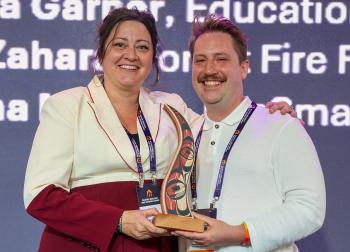Image Caption
Local Journalism Initiative Reporter
Windspeaker.com
Dr. Amy Cardinal Christianson is one of five recipients of the 2025 Lynn Orstad Award: Women in Wildfire Resiliency.
Christianson accepted the award during the 2025 Wildfire Resiliency and Training Summit held in Penticton, B.C. earlier this month.
The award, presented by FireSmart BC, FireSmart Alberta and insurance/investment company the Co-operators, recognizes women who have made significant contributions to advancing wildfire resiliency across the country. Lynn Orstad was a community leader who advocated for wildfire resilience working in emergency management, wildfire risk reduction and community education. She passed away in 2021.
Other recipients were Dr. Kira Hoffman, Nora Hannon, Amanda Reynolds and Shelly Harnden.
Christianson, a 43-year-old Métis woman from Treaty 8 territory, is the senior fire advisor for Indigenous Leadership Initiatives. She works with communities across Canada to bring back traditional fire practices.
“Amy has worked in the field of fire management and Indigenous stewardship for about 20 years and has been a strong advocate for thinking about fire, particularly as it relates to Indigenous rights and supporting cultural burning,” said Alex Zahara, forest fire research scientist with the Reciprocity, Ecology and Diversity in fire (REDfire) Lab and who, among others, nominated Christianson for the award.
“She is really a path breaker in the field and works so well at building community support and really championing Indigenous practices.”
Christianson co-authored First Nations Wildfire Evacuations: A Guide for Communities and External Agencies. She hosts the Good Fire podcast and has been featured in numerous articles, most recently in Chatelaine.
“What we call it is Indigenous fire stewardship,” said Christianson of her work. “So, anything, any activity related to fire where Indigenous people are asserting their rights… anything that communities want to do related to fire.”
Historically communities used to clean the land using fire, however, those practices were stopped when settlers came.
“That is what led up to this big build-up and fueling the unhealthy forests we have,” Christianson said.
Another area her work focuses on is improving emergency management within communities, working with Indigenous firefighters and the recovery of communities once a fire has taken place.
One of her main goals is to increase Indigenous leadership in these areas of wildland fire management.
“In the Canadian population we only make up five per cent of the population but make up 42 per cent of wildfire evacuation events in our community. Even though we're impacted so much by fire, we're often left out of decision making. So, there's still that real kind of patriarchal, that the parent, the government, will come to help and you just kind of sit there and accept that,” Christianson said.
This mindset is shifting now throughout the country, she explained. Indigenous people are now being recognized for their extensive knowledge of the land and about fire “and we should be the ones that are doing decision making.”
Following numerous devastating fires throughout the last decade, it was recognized the current practices weren’t working. Pre-settlement cultural burning practices are now being re-examined as historical evidence shows they effectively reduced these fire risks to communities.
“It’s basically using fire on the ground to achieve different cultural objectives,” she said. “For example, in an area around where community was, they might see that their berry bushes were getting overgrown and there was a lot of grass coming in. They would go and they would burn that area and they would do these, what we call light burns or cool burns, where you burn at a certain time of the year where it is less likely to get out of control fires, in early spring or late fall, and that would help to rejuvenate the berry plant.”
Her knowledge of traditional practices and interest in fire stems from when she was just a young women.
She started her studies as a volcanologist, travelling to New Zealand to get first-hand experience researching volcanoes. However, her heart was in western Canada treaties 6 and 8 territories, so she returned home to continue her studies focusing on fire.
“I grew up in the north where I think fires were much more common. Not the fires that we're seeing today, but, you know, it wasn't uncommon to have smoke or have members of your family or people you know employed as wildland firefighters and I think it was only when I moved to Edmonton, as like an urban centre, that I learned that wasn't a normal experience for most people. And so, I started working on a research project with some Elders, looking at what they were doing in their communities.
“That was really where I got interested in it. And then, you know, I started really looking at the power dynamics because, in the end, it's not really a story of fire, but it's actually much more of a story of power and structural racism, right from different agencies and who controls what happens on the land.” She said her family members have always been advocates in different fields. “I think that was really what caught my attention is like, ‘well, why aren't we doing this and why can't we do this and why do we have to be allowed to do things?’” she said.
Christianson used the $1,000 grant award to support wildfire resiliency effort she and her husband, a wildland firefighter, are involved in as she continues her work nationwide.
“I’m using mine to do some cultural burning work … because that’s one thing that’s very difficult to get funding for,” she said.
Christianson said she was honoured to stand with the other women to receive the award as “they’re all exceptional women in their field.”
“I’m really thankful to the family of Lynn Orstad that they decided to start giving this award to recognize women because, you know, often times, especially in fire, it’s a very male dominated system,” she said.
Local Journalism Initiative Reporters are supported by a financial contribution made by the Government of Canada.

